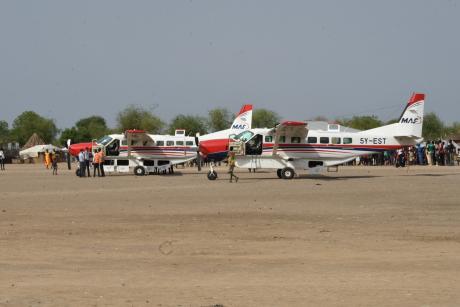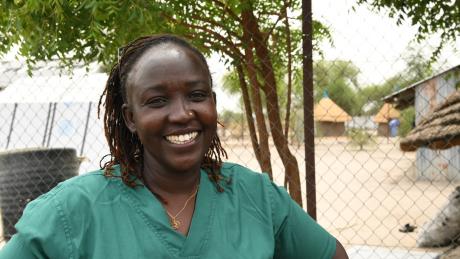
Weeks spent sleeping in tents and endless hours in planes and 4x4s are a small price to pay for the opportunity to save the sight of her fellow South Sudanese. MAF Passenger Dr Aja Paul is one of only four qualified ophthalmologists in South Sudan.
Every outreach begins and ends with a MAF flight bringing the medical team, specialist equipment includes microscope, consumables and other medical supplies to the nearest airstrip. Dr Aja appreciates being able to travel with MAF.
‘MAF are organised and so professional. Every time they are so on time and the way the pilots take care of their passengers. They greet people. Take time to pray and explain what they are doing. It all feels very organised. I have never experienced this kind of service from another airline,’ she says.
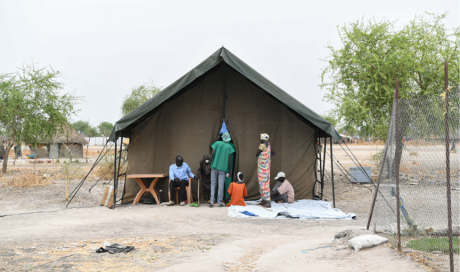
‘You guys have made it even better by coming to see the work we do. It means a lot when people show interest in our work. MAF is doing a good job. It is very good partnership.’
She is an enthusiastic advocate for the eye camps as a way of reaching as many people as possible who wouldn’t normally have access to the services they need.
‘I move around. I’ve been to different places. It is the nature of our work. Sometimes you have to move for the patients. With so few surgeons, we have to come out to the field. We can’t wait for people to come to us.’
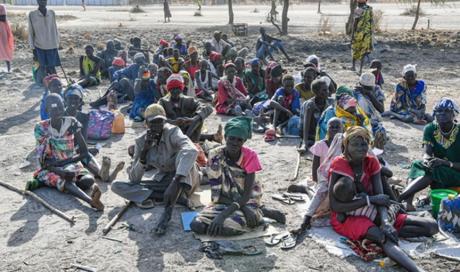
‘People in Juba can afford to access treatment and can even go outside Juba. But in areas like Kapoeta there is no service that people can access. We are only four ophthalmologists in the whole of South Sudan. We are not able to reach every area,’ Dr Aja says.
Getting help to the patients isn’t always easy. On the recent outreach to Kapoeta East, the team had a two-hour drive from the airstrip to the clinic where the eye camp was held. Returning to the airstrip, Dr Aja’s convoy was stopped in its tracks at the banks of a swollen river. With no cell reception, a teammate waded in to try to find a safe path across.
This wasn’t the worst experience she’s had.
‘Bentiu is both muddy and flooded! The day you leave Bentiu you pray that it is not raining,’ she says recalling a recent outreach.
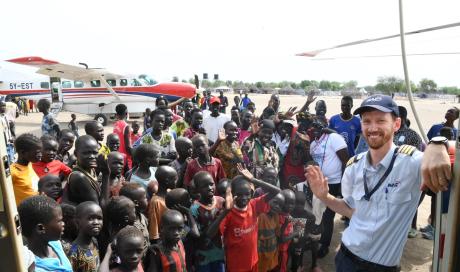
Dr Aja laughs as she recalls her most challenging outreach to date.
‘The outreach in Lafon was the worst journey I’ve done. I’ve never been on such a tough journey, the car got stuck in a really bushy area where there was nothing and nobody to help. We slept there on the road until the second day. It was tough. The rescue team trucks went into water. Even the posho maise meal, the food we took, got wet! We had to wash it,’ she laughs.
‘I went to sleep in my tent one night in Lafon and found a big cobra in my tent. I just ran away, and some people came and killed it. It was very big! There were scorpions too. We encounter many animals on the road, even lions. At night when we were sleeping in our tents you could hear the animals pass by outside. It’s God’s protection that keeps us safe.’
Despite the challenges, her commitment to ensuring that patients in remote areas receive the best care possible is unwavering.
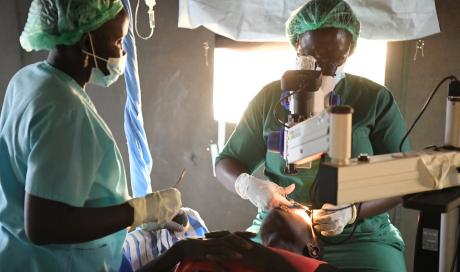
‘On outreaches you need an ophthalmologist to oversee and be in charge, because if anything happens you are the one that is going to shoulder that responsibility. We want our patients to see but if you are not careful enough, they are going to lose their sight forever. Sight loss is irreversible.’
She feels compassion for her patients and their circumstances, and advocates for them by providing the best possible care, even when there is little sight to save.
‘You have to be tough as a doctor, because sometimes, even when you are doing the surgeries, the conditions might be quite advanced. We take them to theatre when the condition has already significantly reduced their vision.’
In these cases, helping the patients understand their prognosis and manage their conditions can be hard.
‘We have to explain to them that we are not trying to increase the vision, just maintain the vision they have left. Even if they have navigational vision where they can do the things around them.
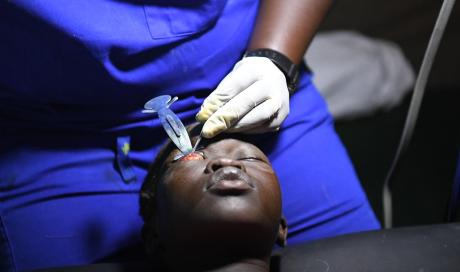
‘Thankfully, the majority of cases are more hopeful. The two most common conditions, cataracts and trachoma, can be treated.
‘When people come to us, their eyes are blind. They don’t know that this blindness is something the is reversable because cataracts is reversable blindness, it is not permanent. Coming here, and treating thousands of people, you feel like you are really giving a service to your community.’
The patients who are resting under canvas in Loolim, Eastern Kapoeta, are eager to pass on their thanks. An elder gets to his feet to speak on behalf of everyone who has received surgery. He addresses the doctor directly in the Toposa language.
A bystander summarises what’s being said in a gruff response that doesn’t sound like a positive exchange. ‘He was very happy that his sight has been restored but says there are very many villages outside that still need some help. They expect the outreach to continue in response to the need.’
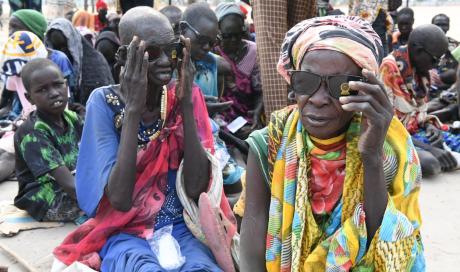
Dr Aja choses to be in South Sudan rather than working in a well-equipped hospital in Kenya where she gained her Opthalmic training at the University of Nairobi and gained experience at Longisa County Referral Hospital in Bomet County and in Lavington, Nairobi.
‘I was in Kenya, my kids are there, but I thought, let me come and help the community and make a difference. That is why I decided to come and work in South Sudan. Always there is something touching me, like I should go home to help my community. We have helped many patients. This is the legacy I will leave behind,’ Dr Aja adds.
